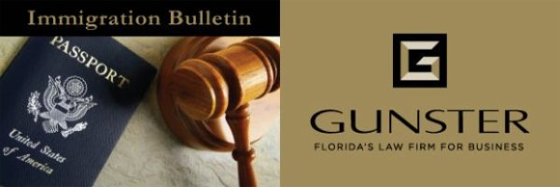
Our Immigration Bulletin dated January 24, 2011 reported on Florida Governor Rick Scott’s second Executive Order 11-02 requiring state agencies to use the federal government’s E-Verify system for the employment eligibility verification of state employees and contractors. We noted that the Executive Order required state agencies under the direction of the Governor to include, as a condition of all state contracts, an express requirement that contractors use E-Verify for: (a) all persons employed during the contract term by the contractor to perform employment duties within Florida; and (b) all persons (including subcontractors) assigned by the contractor to perform work pursuant to the contract with the state agency. Although implementation of the Executive Order had been delegated to the agencies, we anticipated additional guidance addressing issues related to: the specific agencies to which the Executive Order applies; the types of contracts and dollar thresholds that are outside the ambit of the Executive Order; the applicability of the Executive Order to existing state contracts and to current employees of contractors and subcontractors; and any flow down of the requirement to sub-subcontractors.
Executive Order 11-116, issued on May 27, 2011 provides some clarification. The requirement for state contractors to use E-Verify applies to “all contracts for the provision of goods and services to the state in excess of nominal value” in which there is an express requirement for such use. Consequently, because an express clause in a contract is required, existing contracts do not automatically contain this provision. However, existing contractors should consult with the state agency’s contracting official to determine when and if inclusion of this requirement is contemplated. In recognition of the limitations on the use of E-Verify imposed by the federal government, the new Executive Order only applies to new employees hired during the term of the state contract and not existing employees, i.e., those already employed at the time the contractor enrolls in E-Verify. The new Executive Order expands upon the prior parenthetical flow down requirement to subcontractors by mandating that the state contract also include “an express requirement that contractors include in such (sic) subcontracts the requirement that subcontractors performing work or providing services pursuant to the state contract utilize the E-Verify system” for all new employees hired during the term of the state contract. It is clear that the E-Verify requirement flows down to subcontractors. However, it is unclear whether this language mandates that subcontractors must include an express provision in their subcontracts mandating that sub-subcontractors use E-Verify.
For more information, please click on the following links:
Executive Order No. 11-02
Executive Order No. 11-116
New Revision to USCIS’ Handbook for Employers (M-274)
USCIS has released a 6/1/11 version of the Handbook for Employers, a guide to assist employers in understanding and complying with the Employment Eligibility Verification (Form I-9) requirements. See below for a link to the latest version. Our March 3, 2011 Immigration Bulletin discussed version 01/05/11 which contained significant changes. The newest version appears to retain all of those changes and only appears to add a few minor additional clarifications. This is a particularly beneficial publication for employers attempting to comply with the employment eligibility verification requirements, especially in view of the increased federal and state focus on enforcement against employers.
For more information, please click on the following link:
M-274, Handbook for Employers (6/1/11 Revision)
|
This publication is for general information only. It is not legal advice, and legal counsel should be contacted before any action is taken which might be influenced by this publication. Established in 1925, Gunster Yoakley is one of Florida’s oldest and largest full-service law firms. Its substantial and diversified practice serves an extensive client base of international, national and local businesses, institutions, local governments and prominent individuals. The firm maintains a strong presence in Florida with offices in Fort Lauderdale, Miami, Palm Beach, Stuart, Vero Beach, West Palm Beach, Jacksonville, and Tallahassee. Gunster Yoakley is home to more than 160 attorneys and 329 employees, providing counsel to clients through 18 practice groups including corporate, immigration, employment, technology and emerging companies, tax, banking and financial services, real estate, land use and environmental, business litigation, and private wealth services. |
